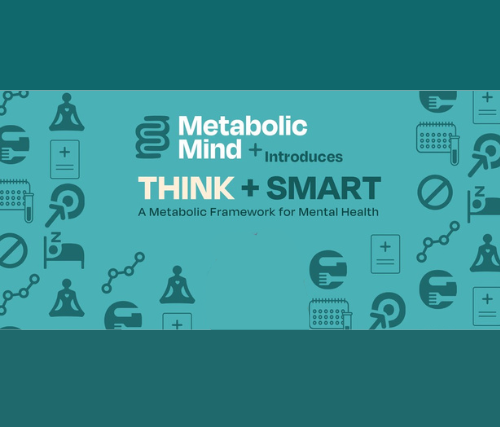From Trial and Error to a Plan: My Journey with THINK+SMART
What is the THINK+SMART Initiative?
I never expected that cutting carbs would change my brain—let alone my life. But in 2022, after a simple diet experiment, I discovered the profound effects of ketosis on my mental health. When I later found Metabolic Mind and their THINK+SMART initiative, I realized I wasn’t alone.
I first discovered MetabolicMind.org a few years ago while researching therapeutic ketosis on YouTube. Founded by the Baszucki Group, Metabolic Mind is a nonprofit organization dedicated to exploring the link between metabolism and brain health to advance the study and treatment of mental illness.
After accidentally experiencing the dramatic effects of ketogenic therapy on my own condition, I was thrilled to find a community compiling research specifically on ketogenic therapy for mental health. Until then, most of the resources I found focused on using ketosis to treat type 2 diabetes and autoimmune conditions.
In January 2025, Metabolic Mind launched THINK+SMART, a community-inspired framework of metabolic and ketogenic strategies designed to support mental health. The acronym THINK stands for Therapeutic Integration of Nutritional Ketosis, outlining medical ketogenic protocols and strategies for mental health improvement. It provides a comprehensive roadmap for designing a personalized ketogenic approach, covering everything from choosing the right care team and medication management to nutritional strategies, testing, and supplementation.
While THINK outlines the metabolic strategies I’ve already found life-changing, SMART provides the lifestyle framework that has helped me sustain these benefits. The SMART part of the initiative highlights key lifestyle practices essential for metabolic health: Sleep, Movement, Avoid (toxic substances and experiences), Rebuild (resilience, connections, purpose, relationships), and Track. Much of what THINK+SMART outlines aligns with strategies I discovered through years of research and trial-and-error self-experimentation. Seeing it all compiled in one place was both validating and exciting—not just for refining my own approach, but also for helping others interested in ketogenic therapy as part of their treatment.
Therapeutic Integration of Nutritional Ketosis
When I first stumbled into therapeutic ketosis, I quickly realized there was a lot to learn—not just about why this approach was working but also how to maintain the improvements I was experiencing. The more I learned, the more questions I had. Adding to the complexity, my initial dramatic improvements didn’t continue in a linear fashion. While many of my psychiatric symptoms remained significantly better, new challenges arose, such as fatigue and digestive issues, which required diligent research and experimentation to resolve.
My care team was supportive of my decision to pursue this treatment, but they were no more well-versed in its details than I was. Navigating medication adjustments and other aspects of treatment became a collaborative learning process.
When I saw how Metabolic Mind organized the THINK strategies, I was excited. Many of the nuances my care team and I had to figure out through trial and error were addressed in a beautifully structured way. There are many different paths to achieving therapeutic ketosis, and Metabolic Mind outlines several, providing guidance on testing, meal timing, and supplementation. Rather than offering a rigid step-by-step guide, THINK presents key principles that individuals and their care teams can use to design a fully personalized treatment plan.
SMART: Lifestyle Practices for Metabolic and Mental Health
Sleep
The importance of sleep for mental health has been emphasized to me by healthcare professionals for over a decade. It’s well known that disruptions in sleep patterns can both signal and contribute to mental illness. For me, sleep is the canary in the coal mine of my bipolar disorder—when it becomes an issue, I know I need to take action to better manage my condition.
The team at Metabolic Mind has compiled a comprehensive list of strategies to improve sleep quality. Relatively simple lifestyle changes, such as getting 2–20 minutes of daytime sunlight exposure or wearing blue-light-blocking glasses in the evening, can make a notable difference. The SMART framework highlights the circular relationship between sleep, mental health, and metabolism: "Healthy metabolism drives good sleep, and healthy sleep improves mental and metabolic health."
Because sleep is a key indicator of how well my condition is being managed, tracking my sleep patterns is an essential part of my strategy. Other key elements of my routine include taking a hot shower before bed, keeping my bedroom cool, and wearing a sleep mask.
Move
Research has shown that exercise can be as effective as medication in improving symptoms of mental illness. Movement plays a critical role in metabolic health, impacting blood sugar regulation, inflammation levels, and overall brain function.
One of the challenges with exercise and mental health, however, is sustainability—both in terms of motivation and physical capacity. I’ve found that the type of movement that works best for me depends on my energy levels and mental state. On low-energy days, something as simple as a short walk outside can make a difference, while on better days, I might engage in strength training, yoga, or high-intensity exercise.
The SMART framework encourages finding movement that fits an individual’s needs and abilities rather than adhering to rigid exercise routines. For me, consistency is more important than intensity, and I prioritize movement that I enjoy and can sustain long-term.
Avoid
After experiencing how dramatically something as seemingly harmless as carbohydrates could affect my mental health, it was no surprise that the SMART strategy encourages avoiding substances known to harm both mental and metabolic health, such as nicotine and alcohol.
I appreciate that the team at Metabolic Mind promotes a flexible approach that meets individuals where they are—ranging from complete abstinence with support groups to harm reduction strategies aimed at minimizing use.
For me, I accidentally discovered how ketosis benefits my mental health while conducting an experiment to quit smoking (read more about my discovery here). Unfortunately, while a ketogenic diet has dramatically improved my mental health, quitting nicotine has been a much harder challenge. Inspired by the SMART framework, I’m now combining multiple strategies to finally break my dependence on cigarettes while gradually weaning off nicotine.
Rebuild
One of the most crucial aspects of recovering from mental illness is rebuilding the areas of life that have been damaged by the condition. The team at Metabolic Mind describes this category of the SMART strategy as “everything else” that supports recovery and long-term well-being.
This includes a broad range of strategies, from meditation, breathwork, and community-building to exploring personal purpose, relationships, and alternative therapies like psychedelics. Since each person’s experience with mental illness is unique, SMART provides a flexible framework for individuals to find what works best for them.
For me, this is the area I feel I need to work on most. While I practice regular meditation, yoga, and therapy, my illness left a community-sized hole in my life that I need to start addressing. After years of isolating during illness, I’m unsure where to begin. Should I start with local support groups? Online communities? This is an area where I’m still figuring things out. Additionally, as my health continues to improve, I feel compelled to expand my life’s purpose beyond simply recovering from mental illness.
Track
Early in my recovery journey, I realized how tracking and gathering data can be incredibly helpful in fine-tuning strategies. Since discovering therapeutic ketosis, testing my blood ketones and glucose levels has become an essential part of managing my condition.
However, even before ketosis, I found tracking my mental health symptoms—such as depression, anxiety, irritability, and energy levels—provided invaluable insights for me and my care team. I love that Metabolic Mind includes these kinds of self-assessments as part of the SMART strategy.
While wearable devices and blood tests can offer helpful metrics, sometimes something as simple as a daily mood chart on a 1–10 scale is enough to track progress and identify patterns.
Conclusion
The THINK+SMART framework resonates deeply with me because it organizes everything I’ve learned through years of research and experience into a structured, accessible system. While I’ve already implemented many of these strategies, this initiative has given me a clearer roadmap for refining and expanding my approach.
Moving forward, my biggest focus will be on Rebuild—reconnecting with community, strengthening relationships, and defining a new sense of purpose beyond recovery.
I’m excited to continue this journey and to see how the THINK+SMART framework evolves as more people contribute their experiences. If you’re interested in mental health, metabolic health, or ketogenic therapy, I highly recommend checking out MetabolicMind.org.






